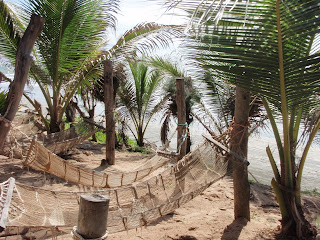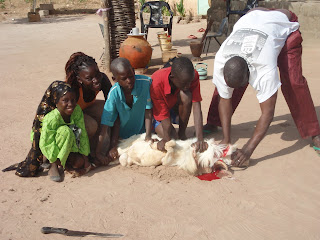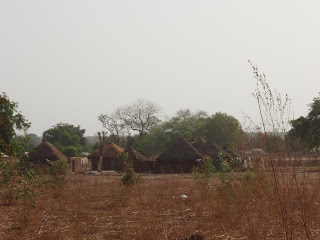The Scholarship Pageant
Each of the 6 regions in The Gambia were instructed by the Government to select 10 girls from years 7-12 to represent their Region in The Gambia Scholarship pageant. The president got the idea from Miss Black USA, held in The Gambia in 2007. Regional finalists will compete in the capital, Banjul. The 10 winners will receive a scholarship for high school or University. My role as part of the Education team was to assist with the organisation of the event. Planning began 2 months prior and each school was to select 5 students. Criteria included Talent, Knowledge of The Gambia, Beauty/Appearance and composure, Knowledge of the July 22nd Revolution and advocating for a community issue.
I was a part of the planning committee and led this group to decide on the Programme , management and logistics of the pageant. For those who know me, I love to organise, so I was thorough, working out the pageant running time schedule, catering, accomodation, format etc. and with the planning team, made a list of recommendations and tasks for the Regional team to follow through on.
Leading up to the day I consulted with the Deputy director to ensure all was organised and offered my assistance, but was told all was arranged. I felt that maybe it wasn't quite all planned and suggested and devised a judges score sheet divided into criteria, total tally form for each girl, certificates for the participants, list of contestants names with corresponding number, made contestant numbers and asked the deputy to devise a script of questions based on the criteria to ask each of the girls. I suggested perhaps a few less questions, but the deputy was keen to range of questions about The Gambia. This was fine, I didn't want to run the show, just support as much as i could. I really couldn't do much more, the rest was left was up to the Regional Team.
On the day, I was led to believe the plans agreed upon were still in place, how wrong I was!! The initial plan was all girls arrive by 11am for a 11.30am start. As the day progressed, I began to grow more and more impatient and frustrated. Half the girls had arrived by 10am.The venue had moved from our office, where the girls were staying in lodges to a venue half an hour walk away. Lunch was due at 1.30pm, it came at 4.30pm. I travelled with the deputy to a judges house at 4pm to remind the judge about the pageant. We moved chairs etc to the new location.I really cant explain my growing frustration, knowing that the event would take at least 9 hours.
Finally we arrived there at 6pm, the crowd started to grow and all the girls began to arrive..finally!!! The massive sound system was hooked up and lights were placed around the outside venue. The venue was a Youth Centre, the chairs were arranged on the edge of a basketball court. Girls were able to get changed and wait inside the Youth centre. At this stage I was still unsure of the role I would play, I 'want to take over, as it was their pageant but I did want to support the education office. And to be honest, I was still frustrated that I'd been hanging around for 6 hours waiting for it to all start.
Anyway, I noticed that nooone was really getting any of the girls or teachers organised , the deputy was off picking up all the judges in the ute, the education team were sitting on chairs waiting for it to begin and a person was on the door charging around 25 cents AUS entry, a great fundraising idea. Amongst all this, the music from the sound system was blaring, I really couldn't hear myself think. So I ventured into the hall and started handing out numbers to the girls, although many girls had been swapped and their names didn't match my list, so much effort was placed on getting spellinh their names correctly. Teachers were asking me what the girls were wearing first, their school uniform or african dress, I wish I could answer, but due to many changes in the past 2 days, I really had no idea, I was thinking - just wear african dress, we haven't got time for girls to get changed and come out again, but it wasn't my decision to make and the deputy was still picking up the judges. On his return I politely suggested that we had no time for the girls to get changed, but he insisted. After the bedlam of getting all the changed names and numbers handed out to 60 girls, amongst doing all this the deputy asked me to inform the judges of the criteria and how to go about awarding points ahh!! Noone was around to do this. The crowd outside was starting to grow, the music was blaring, the girls could hardly hear me as I gathered them together to explain the outline of the eveing, it really was quite a funny nightmare. At last the first contestant came out on the stage, it was 8,15pm. I really couldn't believe it, 60 girls, 10 minutes /girl.. the event would end at 4am. I informed my colleague of finish time, laughing as I spoke to him, he laughed but didn't believe me. I explained my reasoning, he still laughed.. was going to be a long night. The deputy asked the girls mostly the same questions, after 4 hours of this it became excruciating, worse that watching paint dry. There was at least 700 people in the crowd, all very patient and supportive.
By 11.30pm, the director and colleagues began to finally believe how long it would take, I suggested cutting out 3 questions less on their second round, this they did. The director also had to go and collect the food for the girl's dinner. They ate at midnight. The crowd started to leave from 1am, by 2.00am there was only 3 people in the crowd, with all chairs packed up. The judges hadn't moved, a few education staff , the deputy still on the microphone asking the same questions and music blaring between each of the girl's walk onto the stage. I was sitting on chair, half asleep calling out the girls numbers. "Number 55, get ready, your next. " The evening finally finished at 3.30am, just crazy. The girls then piled in the back of two utes back to their accomodation.
So, my day didn't quite go as planned, i thought the 11.30am start, held inside the education building hall, low key event. But what I learned about was the brilliant community spirit, patience shown by everyone and the attitude of..'it will happen when it happens.' I saw the funny side of the event and am glad I was able to be of assistance. I am learning Gambian programs start late and its ok if noone is left in the audience at the end. Although I still personally prefer organisation and structure, I just have to go with it and not become too frustrated. What an evening!!








































